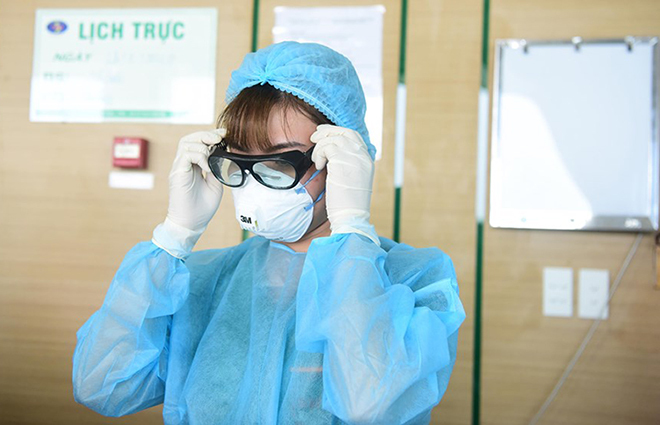Dr. Nguyen Hong Ha, Vice Chairman of the Vietnam Society of Infectious Diseases, said the risk of infection increases when contact with an infected person within 2 meters or less. Anyone who accidentally inhales or comes into contact with droplets on surfaces, clothing, hands, and feet will be infected.
The latest research shows that nCoV incubates for about 5 days, which can be wider from two to 14 days. Thereafter, the patient began to develop symptoms of fever, cough, and sneezing.

|
Medical staff wearing protective gear to the pneumonia isolation area at the National Hospital for Tropical Diseases 2. Photo: Giang Huy. |
The ability to spread during the incubation period of COV and the virus is generally low, because the virus has not been eliminated by the body through coughing and sneezing activities.
In terms of contagiousness, when symptoms appear, the nCoV virus will spread faster and more strongly than the Corona virus strains causing SARS and MERS.
"Viruses have to pass through droplets, secretions from the disease source to be able to enter the human body and not transmit itself through the air", said Dr. Ha.
So wear a mask to protect the respiratory tract and avoid inhaling droplets containing nCoV. Change the mask regularly and do not come in contact with the outside of the mask.
Dr. Ha also recommends covering her mouth with disposable tissue or elbow when coughing or sneezing to prevent virus spreading to the surrounding environment. People also need to maintain regular hand washing to reduce contact with the virus and avoid sucking hands, putting hands on mouth and eyes.
According to the director of the Institute of Medical Equipment and Medical Works Le Thanh Hai, nCoV exists in the respiratory secretions of infected people both the incubation period and the onset of illness.
When the sick person spits or sneezes, secretions will be released in the air. Normally, exudate particles over 5 micrometres will fall to the ground by themselves, exudate particles over 5 micronmeters (very few) will be suspended in the air.
The average person accidentally inhales or sneezes, coughs in the face, nCoV will get into the nose. When entering the nasal cavity, 95% of the secretory particles containing the virus will be captured by the mucus in the nasal cavity and carried down the throat, then swallowed into the stomach and destroyed by the gastric juice.
In case the virus attacks the nasal mucosa, it will cause symptoms of congestion and a lot of runny nose. Therefore, the increased secretion of secretions, sneezing is the body's protective reflex to expel the disease as quickly as possible. People with sneezing and coughing need to cover a tissue to prevent the virus from spreading to protect those around.
People coming from epidemic zones should comply with medical declaration and quarantine for 14 days because they may have carried the pathogen but not yet onset, easily spread to the community.
If the person does not get sick after 14 days, the person can function normally.
Source: vnexpress.net


















